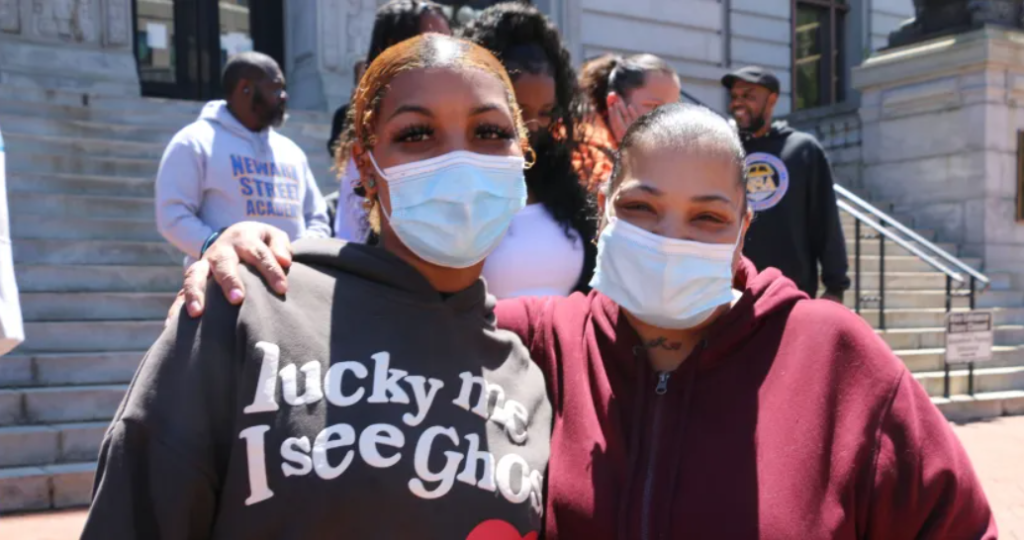Newark will help pay for 40 students to attend college, as free-tuition movement grows

The city of Newark will help pay for 40 local students to attend a four-year university, officials announced Monday, adding to a growing list of municipalities and states seeking to offset the soaring cost of college.
Newark’s new program, called the Guaranteed Education Pilot Program, will help cover the students’ tuition and housing at Saint Elizabeth University, a small, Catholic institution in Morris Township, New Jersey. Participating students must commit to studying social work, psychology, education, or nursing. The city chose Newark students who have endured challenging circumstances, including violence or a parent’s incarceration.
“Those hardships make it difficult for us to do the things we dream about,” Mayor Ras Baraka told the students and their families during a ceremony Monday at City Hall. “This is an opportunity to help you fulfill those dreams.”
The city recruited students from the school district, the youth program Leaders for Life, and the Newark Street Academy, which serves young adults who dropped out of school, officials said. The city’s Office of Violence Prevention and Trauma Recovery and the Brick City Peace Collective, a Newark violence-reduction group, will provide mentoring and assistance to students while they’re in college.
Newark will fund the new grant program with $1 million, officials said. The grant and any state, federal, or institutional aid students receive will cover the full cost of college, so the 40 students should not need to take out any loans, the officials added.
College tuition has risen steadily over the past decade, saddling many students with extensive debt. Black college graduates owe an average of $25,000 more in student loans than their white peers, a major driver of the racial wealth gap.
Elected officials at every level have sought to ease the burden on students. While President Joe Biden’s plan to make community college free for all students has stalled, roughly 300 local governments and 33 states now have programs that help pay students’ college tuition.
In New Jersey, Gov. Phil Murphy has launched grant programs that help fund up to four years of college for students from low-income families. Known as last-dollar programs, the state grants pay any tuition and fees not covered by a student’s financial aid and scholarships. Newark’s new initiative uses the same last-dollar model.
“This announcement underscores our collective commitment to providing a high-quality and affordable education to 40 resolute, brave, strong, and brilliant scholars,” said Saint Elizabeth University President Gary Crosby.
College has long been out of reach for many in Newark, where less than 16% of adults have bachelor’s degrees, according to census estimates. The pandemic added new challenges, leaving some students feeling unprepared for college or unable to afford the costs while their families struggled financially. Last fall, just 41.5% of Newark Public Schools graduates enrolled in college, down 10 percentage points from 2019.
Ronisha Daniels, a senior at Malcolm X Shabazz High School, knew she wanted to attend college but didn’t think she could pay for it. She had just about decided to enroll in trade school when she got a call this Saturday: She was chosen for the city’s free-college program.
“Next thing you know, I had this opportunity,” she said, “and I’m going to take full advantage of it.”
To be eligible for the grant program, students must live in Newark and earn a 1.8 to 2.5 grade point average. They also must have a parent who is or recently was incarcerated, a family member who died due to violence, have faced violence themselves, or would be the first in their family to attend college.
“Our job is to support you with this mission,” said Dawn Haynes, former manager of the Brick City Peace Collective and president of the Newark school board. “I want to see you all graduate in four years and walk across the stage knowing that the work we did wasn’t in vain.”
College completion is a major challenge for students nationwide and in Newark, where fewer than 40% of students who enter college right out of high school earn degrees within six years.
Students in the new grant program will join Saint Elizabeth’s Educational Opportunity Fund program, or EOF, a longstanding statewide effort to help low-income students complete college. Incoming EOF students take summer classes, which are meant to ease their transition to campus life and fill in academic gaps. During the school year, they meet regularly with EOF counselors who track students’ progress and talk through any challenges.
Sariette Ekambi, a student development specialist at Saint Elizabeth, said many low-income students struggle to pay their bills. A former EOF participant, Ekambi worked two jobs — one on campus and one off — to cover expenses. Thanks to Newark’s new grant program, the students will be able to focus on their grades instead of their finances.
“Just not having that burden will be a big help,” she said.
After the ceremony at City Hall, the students piled into buses to visit Saint Elizabeth’s campus and have lunch with Crosby.
Before they left, Ronisha Daniels stood next to her mother, Nikisha Eure, who recalled how college had seemed unaffordable until they heard about the city’s grant program.
“This is a blessing, it really is,” Eure said. “I tell my daughter, do good things and good things will happen for you.”
This article was originally posted on Newark will help pay for 40 students to attend college, as free-tuition movement grows






